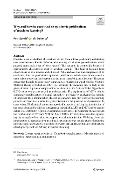Why and how to construct an epistemic justification of machine learning?

Publication date
2024Published in
SyntheseVolume / Issue
204 (2)ISBN / ISSN
ISSN: 0039-7857ISBN / ISSN
eISSN: 1573-0964Metadata
Show full item recordCollections
This publication has a published version with DOI 10.1007/s11229-024-04702-z
Abstract
Consider a set of shuffled observations drawn from a fixed probability distribution over some instance domain. What enables learning of inductive generalizations which proceed from such a set of observations? The scenario is worthwhile because it epistemically characterizes most of machine learning. This kind of learning from observations is also inverse and ill-posed. What reduces the non-uniqueness of its result and, thus, its problematic epistemic justification, which stems from a one-to-many relation between the observations and many learnable generalizations? The paper argues that this role belongs to any complexity regularization which satisfies Norton's Material Theory of Induction (MTI) by localizing the inductive risk to facts in the given domain. A prime example of the localization is the Lottery Ticket Hypothesis (LTH) about overparameterized neural networks. The explanation of MTI's role in complexity regularization of neural networks is provided by analyzing the stability of Empirical Risk Minimization (ERM), an inductive rule that controls the learning process and leads to an inductive generalization on the given set of observations. In cases where ERM might become asymptotically unstable, making the justification of the generalization by uniform convergence unavailable, LTH and MTI can be used to define a local stability. A priori, overparameterized neural networks are such cases and the combination of LTH and MTI can block ERM's trivialization caused by equalizing the strengths of its inductive support for risk minimization. We bring closer the investigation of generalization in artificial neural networks and the study of inductive inference and show the division of labor between MTI and the optimality justifications (developed by Gerhard Schurz) in machine learning.
Keywords
Lottery ticket hypothesis, Complexity regularization, Material theory of induction, Empirical risk minimization
Permanent link
https://hdl.handle.net/20.500.14178/2604License
Full text of this result is licensed under: Creative Commons Uveďte původ 4.0 International






